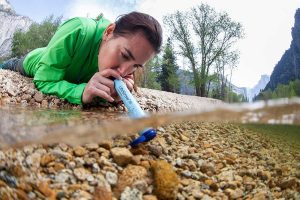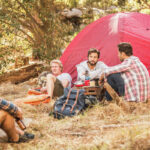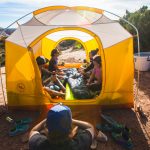It is a well-known fact that camping can be a great way to get away from the hustle and bustle of everyday life. Many people enjoy this activity because it helps them reconnect with nature while giving their family or friends time together. One thing that many people don’t realize is that you have to deal with bugs when you are camping. This article offers some tips for how to avoid these pests so your trip will be more enjoyable.

Table of Contents
Plan Ahead
When you are camping, many bugs will be attracted to your food and body heat. You can avoid a lot of these insects by properly preparing for the trip. One way that you can do this is to make sure that all of your food items are sealed in containers before going outdoors. This includes everything from chips and candy bars to water bottles. In addition, you should avoid wearing bright colors or perfumes when you are camping. These will attract all types of bugs, including mosquitoes and ticks.
Insect Repellent Is Not a Cure-all for Bugs While Camping
Many people assume that insect repellents are a magical cure-all. They offer this product to family and friends as they head out on their trip without explaining how it works. This can be a mistake because some bug repellents are only effective for about 30 minutes at the most. A lot of insects will not get discouraged by this product which means you could end up with several bites within that time period. To avoid bugs while camping, make sure to reapply insect repellent throughout your trip.

Clean Your Campsite
The more time that you spend cleaning up your campsite before going to sleep, the better chance that you have for avoiding bug bites during your trip. Many insects like to come out at night, so it is best if you can sleep in a tent because it will be easier to keep them out. You can also avoid bugs by sweeping your campsite before turning in for the night, which should remove all leftovers that might attract insects.
In addition, make sure that you clean your cooking area after each meal. This will ensure that there is less of a chance for bugs to be attracted to this spot on the next day.
It Is Important To Remember That Bugs Are Part Of Nature’s Cycle
Many people want nothing more than to avoid insects when they are camping because they can ruin a trip. However, it is important to remember that bugs are part of nature’s cycle. If you do not want them bothering your campsite, make sure that you clean up after yourself. This will make it easier for you to avoid bugs while camping.

Be Careful Around Water
Many insects, including mosquitoes and ticks, are attracted to water sources. If you want to avoid these pests when camping, make sure that you stay away from any of the following:
- Lakes
- Waterfalls
- Ponds
- Swamps
- Rivers or springs
Avoid Scented Products
Avoid strong-smelling soaps, lotions, and perfumes. Bugs are attracted to these scents which makes it difficult for you to avoid them when camping. Try using unscented soap products or try wearing light layers of clothing instead because bugs won’t be able to smell your body underneath the fabric.

Clothing
Wear appropriate clothing that covers most of your skin. When you are wearing light-colored clothing it will be easier for bugs to spot you and they will also be able to smell the carbon dioxide that is released when people exhale, so dark colors might help with this problem. Also, avoid going barefoot because most insects don’t like walking on rough surfaces, but if there’s a chance you might get bit by a scorpion or spider then it’s probably best to wear shoes anyway.
Have a Campfire
If you want to avoid bugs while camping, then it is best if you have a campfire. This will provide enough light and heat that insects won’t come near your campsite because they don’t like these things. In addition, try using coils or candles around the area so there’s not as much of a chance for bugs to be attracted to your campsite.

How to Deal With Specific Insects
How to Keep Mosquitoes Away
Mosquitoes are the most common insects to be around during the summer months. There are several ways that you can avoid getting bit by mosquitoes while camping:
- Use an insect repellent with DEET or at least 20-30% concentration because many bugs don’t like this product and it will keep them away from your campsite.
- Keep your tent net closed so mosquitoes can’t enter while you sleep.
- Place coin-sized slices of garlic in areas where mosquitoes gather because this attracts them and they won’t be able to come near the campsite if there’s too many around it.
- If possible, sleep near the fire because mosquitoes don’t like smoke and heat.
- Make sure that you wear long pants and long sleeves. This will not only protect your skin from bites but it might also be the difference between getting bitten once or twice by a mosquito during the night because many of them prefer to bite people’s ankles when they’re sleeping.
Tip: If you do get bitten by a mosquito, try not to scratch the bite which will make the itching worse. There are lots of creams on the market and many natural remedies that can help with the itching.

How to Keep Ticks Away
Ticks are one of the most dangerous insects that you can encounter when camping, so it is important for you to know how to avoid them. Before going on a hike or walking in an area with lots of tall grasses and plants, make sure that your clothing covers as much skin as possible. Also, wear light-colored clothing because ticks are more likely to be found on darker surfaces. After your hike, make sure that you check yourself thoroughly for any signs of a tick that might have attached itself while you were walking around.
If possible, try to avoid bushy or grassy areas when camping and opt instead for an open area with rocks or pavement. Ticks are less likely to climb onto smooth surfaces and they will be easier for you to spot if they do manage to get on your skin.
- If you find a tick, use tweezers or disposable gloves in order to remove it properly so that the head doesn’t stay logged in your skin after the removal which could lead to bacteria being released into your bloodstream.
- If you get a bullseye rash, make sure to go see a doctor immediately because this could mean that the tick has given you Lyme’s Disease and it is important for them to know so they can treat it right away.

How to Avoid Bees While Camping
Bees are attracted to sweet smells, so make sure that you do not wear perfumes or other scented products when going on your trip. The best way for avoiding bees is to avoid wearing bright colors and opt instead for darker shades. If you do see a bee, don’t swat at it because this will only make them more aggressive and they will be more likely to sting you if you do so. Instead, try to retreat slowly.
- Avoid wearing bright colors because these will attract the most attention from bees.
- If you do get stung, remove the sting as soon as possible with a pair of tweezers or disposable gloves because this will make it easier for your skin to heal after the bee sting.
- If you do get stung by a bee, try not to rub the sting because the venom is most likely to spread when you do this. If possible, try to remove any hair that might be close to where the sting is located because the bee might have left some venom on it.
Note: If you are allergic to bee stings, make sure that someone knows what to do in case of an emergency.

How to Avoid Slugs While Camping
Slugs are usually not an issue when camping, but it is good to be aware of some ways that you can avoid them.
- If possible, make sure to avoid eating any products that might have fallen on the ground because slugs are more likely to be found on surfaces that aren’t very clean.
- If you do notice a slug, try not to touch it because they carry bacteria that can cause infections. If you accidentally touch one, make sure that you wash your hands as soon as possible because this will prevent any bacteria from spreading to other parts of your body.
- If you or someone else gets bitten by a slug, make sure to wash the area with soap and water to make sure that the bacteria doesn’t spread.
Note: Remember to always wash your hands if you or someone else touches a slug.

How To avoid Spiders while Camping
Spiders can be a threat while camping because they are usually very aggressive and will bite if provoked. If you do spot one, make sure to stay calm and back away slowly. If you have a tent, try not to leave it open because spiders can crawl in if they notice that there is a space available for them to get in. If you do spot one, make sure that you remove it from the area and seal up any holes in your tent to prevent any other spiders from crawling in.
- If you or someone else is bitten by a spider, make sure that you go see a doctor as soon as you can because the bite might be poisonous.
- If possible, try to remove the spider by using a pair of tweezers or disposable gloves.
- If possible, make sure to avoid dark areas when camping and try to sleep in a tent instead because spiders are more likely to come out at night and you don’t want them crawling on you.
Note: remember to always be careful when camping because it is easy for you to get bitten by one of these creatures.

FAQ
Q.What is the best insect repellent to use while camping?
A.The best insect repellent is one that contains DEET and it should be applied over all exposed skin so you will stay protected for a long period of time. You can also opt to apply bug spray on your clothing in order to protect yourself from insects when they land.
Q.How can you avoid getting bitten by mosquitoes while camping?
A.Mosquitoes are attracted to dark colors so it is a good idea for you to wear lighter clothes when going on your trip. You can also use mosquito repellent in order to keep them away from the area and make sure that they don’t bite anyone else either.
Q.What should you do if someone gets bitten by a bee?
A.If someone does get stung, it is important for them to remove the sting as soon as possible with tweezers or disposable gloves in order to keep the venom from spreading further than necessary. It is also good that they wash their hands with soap and water afterward to make sure that the venom doesn’t spread. If someone is allergic, they should let someone know what to do in case of an emergency because it will be different than if you are not allergic.
Q. What are the symptoms of Lyme’s Disease?
A. Symptoms can include fever, headache, muscle aches, and fatigue. If you get a bullseye rash, make sure to go see a doctor immediately because this could mean that the tick has given you Lyme’s Disease and it is important for you to get treated as soon as possible.
Q. What if I think that a tick has bitten me?
A. If you notice any ticks on your skin, make sure to use a pair of tweezers or disposable gloves and remove it as quickly as you can. If possible, try to remove the tick by its head because this will prevent it from releasing more saliva into your body after you have removed it. If possible, try to avoid touching the tick with your bare hands because you might get an infection if it is carrying bacteria. If possible, make sure to save the tick in a jar because this could help your doctor if you need to get tested for Lyme’s Disease.
Q. What to Do in Case You Get Bitten by a Bug While Camping?
A. Although it is important to try and avoid bugs while camping, there are some situations when you won’t be able to. This means that someone will likely get bitten at one point or another throughout the trip. In many cases, this can cause an allergic reaction. If you or someone in your family has a bad bug bite, then it is important to clean the affected area with soap and water before applying some hydrocortisone cream. The best way to avoid bugs while camping is by taking precautionary measures beforehand so that you won’t have any issues getting bitten during your trip.
Q. How to Avoid Spiders While Camping?
A. If you’re planning on going camping, it’s a good idea to be aware of how to avoid spiders. One way that you can do this is by making sure that your tent isn’t open at any time because it might attract spiders. If you see one, never try to touch it because they are venomous and can bite if provoked. To make sure that the spider is removed safely, use a pair of disposable gloves or tweezers. It is also important to avoid dark areas while camping because this is when the spiders are most likely to appear.
Q. How to Avoid Slugs While Camping?
A. If you’re planning on going camping, it’s important to know how to avoid slugs. One way that you can do this is by making sure that your tent isn’t open at any time because slugs are attracted to moist environments. If you see one, never try to touch it because it can carry bacteria that cause infections on contact. If you or someone else gets bitten by a slug, make sure to wash the affected area with soap and water as soon as possible.
To make sure that the slug is removed safely, use a pair of disposable gloves or tweezers. It’s also important to avoid dark areas while camping because this is when the slugs are most likely to appear.
Note: Remember to always wash your hands if you or someone else touches a slug.
Conclusion
Bugs are part of nature’s cycle, so it is important to remember that you can’t avoid them 100% when camping. However, you can make it easier for yourself by taking the proper precautions before going on a trip and being careful around water sources because of many insects like this area more than others. By following these tips, you should have a more enjoyable camping experience without having to deal with annoying insects buzzing around your campsite. Each person’s trip is different so the best way to avoid bugs will vary depending on the location, temperature, and time of year.





